The scent of lavender, the mistral sweeping through the valleys, the sound of the Mediterranean lapping against the rocks. French Riviera is first experienced through sensations — a blend of smells, sounds, and colors that strike before the landscapes themselves.
In Nice, the Promenade des Anglais stretches along the sea, while in Cannes the lively terraces blend with a glamorous atmosphere. Further east, Menton offers a more tranquil charm, its pastel façades and citrus-scented gardens inviting a slower pace. In the Luberon or on the Valensole plateau, summer turns the hills into violet waves, a more intimate Provence, closely tied to the land.
Here, the blue of the Mediterranean meets the sharp ridges of the Alps. Sometimes the contrast is striking, elsewhere it softens, but it always shapes a diverse region. Those who love the sea find their horizon here, while those seeking cool air climb into the mountains. French Riviera feels like a mosaic of moments, never entirely predictable.
Top 5 Guided Tours
Places to Visit
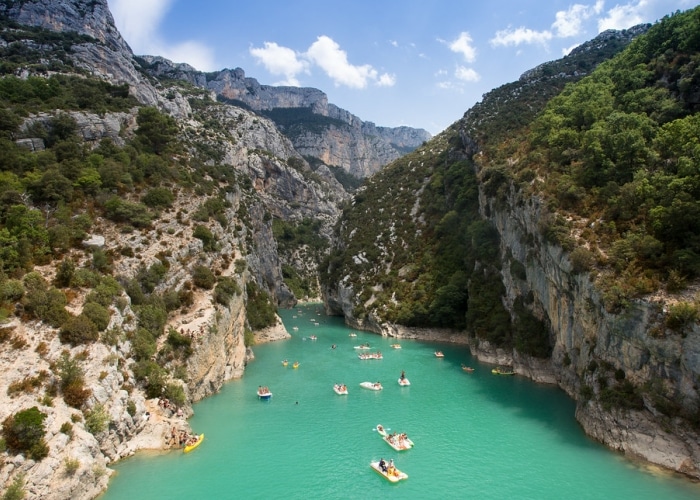
In the heart of Provence, the Verdon Gorge rises like a vast canyon carved by the river. Its turquoise water winds at the foot of limestone cliffs, sometimes several hundred meters high. The contrast between the pale stone and the brilliant water leaves a lasting image, hard to forget.
Several trails make it possible to get close to these landscapes, from easy walks to more demanding hikes. The Blanc-Martel trail follows the river for kilometers, with cliffside paths, tunnels, and dizzying viewpoints. Every turn reveals a new perspective, between sheer rock walls and sparse forests.
For those who prefer the water, the river can be explored by kayak or pedal boat, especially in the lower gorge. Drifting slowly along gives a calmer, almost intimate view of the place. The cliffs seem even larger, as though they were closing off the sky.
The surrounding villages add to the experience, from Moustiers-Sainte-Marie clinging to the mountainside to Castellane with its dramatic cliff and hilltop chapel. The Verdon Gorge offers a landscape of striking variety, where nature reigns without embellishment.
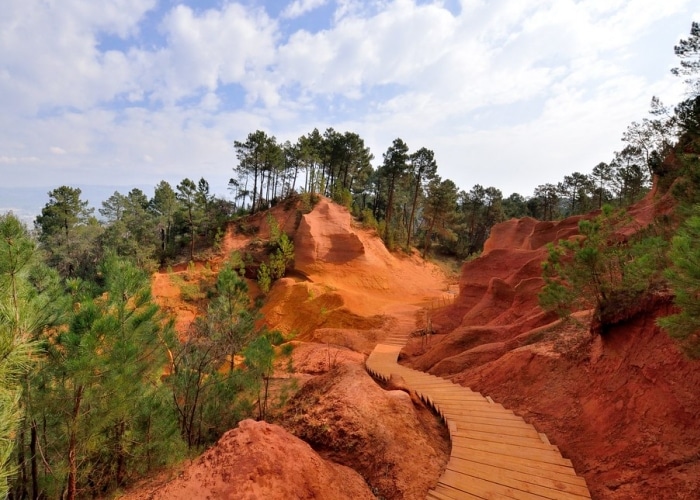
Between the Vaucluse mountains and the Luberon range, not far from Apt, lies the Colorado Provençal. This landscape was shaped first by the retreat of an ancient sea, then by ochre quarrying. The contrast between the colorful cliffs and the surrounding Mediterranean vegetation is striking from the very first steps.
The site reveals an astonishing palette, from pale yellow to deep orange, even bright red. Some formations look like the backdrop of a western film, with jagged ridges and sheer rock faces. The Colorado Provençal feels like a moving canvas, changing with the light and the time of day.
Several trails wind through what is known as the “Colorado forest.” The paths twist between cliffs and pine woods, sometimes narrow, sometimes opening onto wide ochre clearings. Walking here is slow, often punctuated by stops to take in the striped walls or simply to watch how the colors shift under the sun.
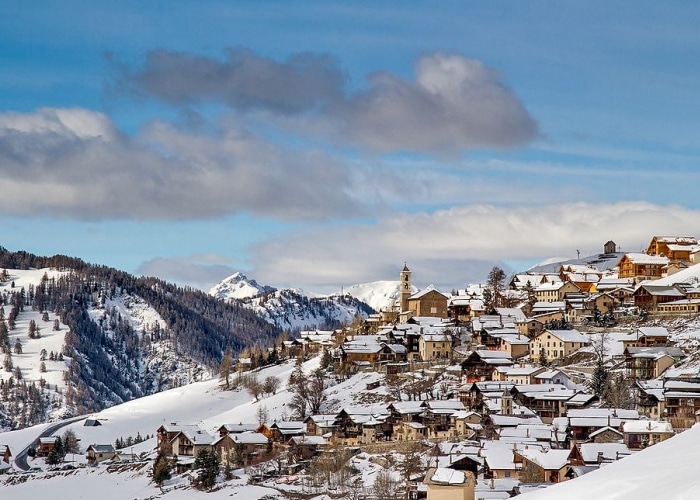
At 2,042 meters above sea level, Saint-Véran lies within the Queyras Regional Natural Park. The village keeps a simple charm, its wooden and stone houses clinging to the slope. The air feels crisp, the sky often crystal-clear, and everything seems to move at a slower pace.
Trails lead to surrounding hamlets, winding through pastures and sparse forests. Slate roofs catch the light, fountains murmur at the corner of a lane. Walking here feels like crossing a mountain that is still lived in, yet quietly preserved.
In winter, Saint-Véran takes on a different rhythm. The Beauregard ski area offers gentle, family-friendly slopes that wind between chalets and snow-covered woods. Skiing here feels uncrowded, almost private.
Above all, this village in the Hautes-Alpes leaves a strong impression of authenticity. Whether in summer or winter, it offers clear images and simple moments that stay with you long after returning to the valley.
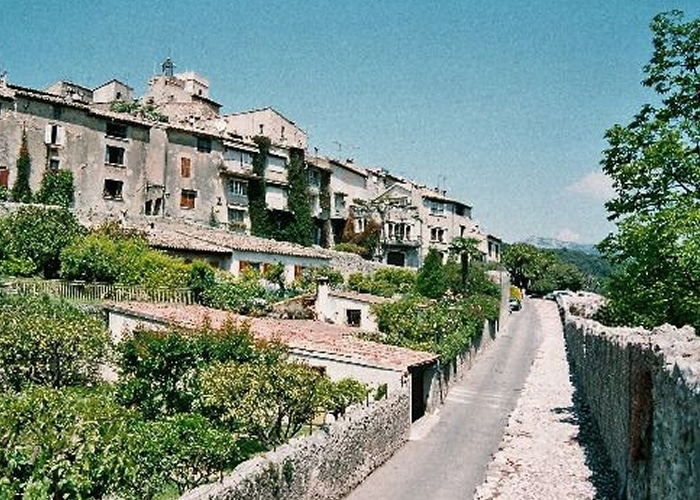
Clinging to the hills of the hinterland, Saint-Paul-de-Vence lies just twenty kilometers from Nice and is easily reached by train along the Côte d’Azur. Behind its ramparts, the village has kept its medieval look, with cobbled lanes winding between stone houses. The soft, shifting light has long drawn painters and writers.
The famous pétanque square still holds its friendly atmosphere. Visitors pause to watch a game, listen to conversations under the plane trees, and feel the unhurried rhythm that continues to shape village life. The place remains iconic, almost timeless.
The walk leads past fountains, hidden gardens, and façades draped in climbing vines. You look up at the ramparts, then step back into the narrow streets. Everything invites you to slow down, to linger.
Saint-Paul-de-Vence is also home to the Fondation Maeght, a renowned modern art center where sculptures and paintings stand in a setting open to nature. This blend of old heritage and contemporary creativity gives the village a special resonance, one that stays with you long after your visit.
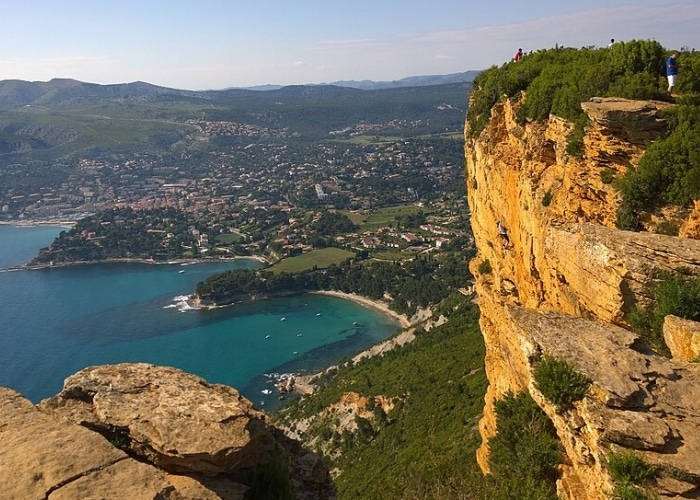
Between Cassis and La Ciotat, the Corniche des Crêtes follows the curves of the Canaille mountain. The road climbs gently, then clings to the edge of the cliffs, among the highest in France. At times, the sea stretches far below, calm or restless depending on the hour, leaving a lasting impression.
Lookout points are set along the Soubeyranes cliffs. You stop almost instinctively, just to take it all in — the rock, the sparse vegetation, the blue melting into the horizon. Some choose to hike instead, two to four hours along a marked trail skirting the cliff face, with the wind as their constant companion.
From certain spots, you can see the calanques of Cassis, jagged and almost unreal from above. On the other side, the bay of La Ciotat opens up, with its harbor and houses clustered around the water. These contrasts give the route a special rhythm, balancing raw nature with traces of human life.